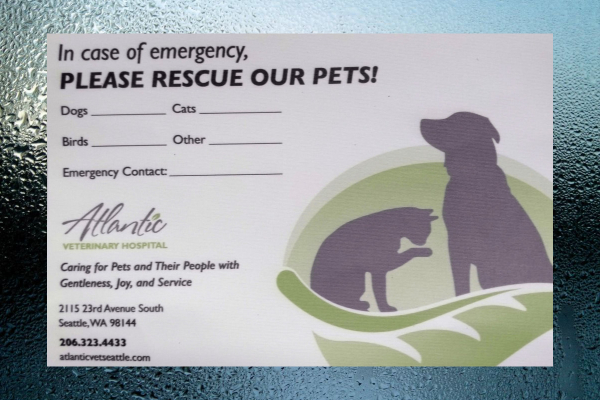Nearly 1,000 home fires each year are accidentally started by pets, according to The National Fire Protection Association.
The number one culprit is a stove or cooktop, particularly a gas stove. Dogs are adept at turning on stove knobs, and cats spring onto countertops, where they can easily nudge or tip over items on a hot burner.
Wood-burning fireplaces are also problematic. What pet doesn’t love to curl up next to a cozy fire? But they can get too close, catching themselves and then, the surrounding furniture, on fire. And dogs who love sticks might grab a smoldering piece of kindling from the fireplace.
Burning candles get knocked over by wagging tails or rambunctious play.
Pet beds get placed against a space heater.
Pets chew on electrical cords, extension cords, or the heater wires of electric blankets, and the exposed wires spark a fire.
Pet-Proof Your Home
Much like parents do when we have a curious toddler in the home, we need to pet-proof our homes to help lessen the possibility of our pets starting a fire.
Here are 7 tips to help you do that:
- Assume that your pet will be curious. Pets love to investigate candles, fireplaces, and cooking appliances. Never leave your pet unattended around an open flame. Before leaving your home, make sure that your fireplace and all candles are thoroughly extinguished.
- Install a pet-proof screen or safety barrier around your fireplace.
- Never play active games (such as fetch or chase the ball) near a lit fire.
- When you’re away and your pet is home, remove stove knobs or protect knobs with covers.
- Never allow your pet to lie on or sleep with an electric blanket, either in their pet bed or in your bed.
- Roll up and tie together long electrical cords and place them behind your furniture in the most secure location possible.
- When you are away from home, secure your pet in a crate or behind a baby gate in an area of the home that does not contain potential fire hazards.
Important Fire-Safety Habits
Install the recommended number of smoke detectors and carbon monoxide detectors. Test them regularly and change the batteries at least twice a year (an easy way to remember: change them when Daylight Saving Time begins and ends).
If you have a home security system, invest in monitored smoke detectors, which alert your service when a smoke alarm has been triggered.
Fire can spread rapidly, leaving you as little as 1-2 minutes to safely escape your home once the smoke detector sounds.
Create a home escape plan and practice your fire drill at night and during the day with every member of our family, including pets! Store leashes, pet carriers, and treats near an exit, which will help you and/or firefighters evacuate your pet during a fire.
While 71% of Americans have an escape plan in case of a fire, only 47% of those have practiced it.
Affix pet alert window clings to your exterior doors and windows. These stickers tell firefighters how many pets and what kind of pets live in your household.
When leaving pets home alone, keep them near entrances where firefighters can easily find them. Pets should be wearing collars. Leashes and pet carriers should be within easy reach, in case firefighters need to rescue your pet.
Free Pet Alert Window Clings from Atlantic Veterinary Hospital

We recommend affixing a window cling to your front and back door. We will provide two free pet alert window clings per household. Request them during your next visit, or ask us to mail you one. We’ll mail them to the first 500 clients who request them.
Home fires impact the lives of half a million pets each year. Follow these preventive measures and help keep your home – and your pets – safe from fire hazards.


